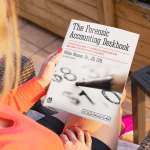Big Divorce Mistake #6: Not Being Skeptical about Financial Documents
What is the role of professional skepticism in reviewing financial statements? Forensic accountants can cross-reference financial documents better than anyone to uncover inconsistencies.

The Forensic Accounting Deskbook by Miles Mason, Sr. JD, CPA, published by the ABA Family Law Section
Miles Mason, Sr. JD, CPA is the author of The Forensic Accounting Deskbook: A Practical Guide to Financial Investigation and Analysis for Family Lawyers, Second Edition, published by the ABA Family Law Section. This updated edition of one the ABA’s most popular resources explains the practice of forensic accounting and business valuation and how to apply it in family law cases. It provides a practice-focused introduction to the core financial concepts in divorce, such as asset identification, classification, and valuation, income determination, expenses, and more.
See Mason’s complete list of the 10 Big Divorce Financial Mistakes.
VIDEO TRANSCRIPT:
Tracy Coenen: Can you talk a little bit about the importance of being skeptical when you’re reviewing financial information in a divorce case?
Miles Mason: At this point in my career as a divorce lawyer, if I see some information, I just assume it’s a lie. I mean I’ve just been around the block that many times. Specifically what we’re looking for is hidden assets and hidden income. It’s often in plain sight. If we’re going to find it, it’s there with a little bit of a look and what we already talked about, the manipulation of financial statements, by looking and comparing. We’ll talk more about that obviously in the future.
Depressed income that you just talked about, very common. Financial statement manipulation, while sometimes it can be expensive to uncover, sometimes it’s not a complicated plot and it may not be all that expensive to uncover, just depends on the scheme, and outright financial fraud may sometimes be rare, but we see it often enough.
What I see is created … I believe that there’s a continuum of lies. There’s the small lie where if I’m working for an accounting firm and I remove a pen that’s got the firm name on it, am I stealing that mechanical pencil, or if I’ve got an eraser that ends up at my house, am I stealing that eraser? Well, that’s not a big theft, but then there’s lying on a tax return. Then there’s lying at a deposition. And to me the highest point of a continuum of lie is lying in the courtroom looking at a judge.
And so at each stage, whether it be filling out a false business expense reimbursement form, or whether it be answering an interrogatory where you know you’re leaving out some information, that lie can be very, very important. And what I want is a forensic accountant to help me looking for that and being very skeptical along the way.
Thank you to Tracy Coenen, CPA, CFF for inviting me to join her in this video series. Tracy is a forensic accountant practicing in Milwaukee and Chicago.









